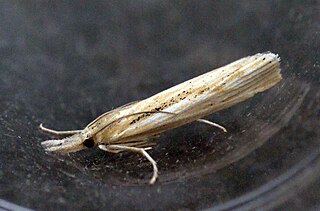
Pediasia aridella is a species of moth of the family Crambidae. It was described by Carl Peter Thunberg in 1788 and is found in Europe. There are three recognised subspecies.
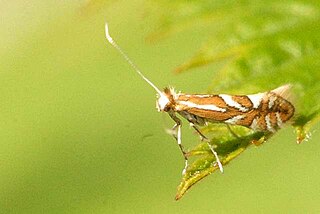
Phyllonorycter oxyacanthae is a moth of the family Gracillariidae found in all of Europe except the Balkan Peninsula. It was described by the German-born Swiss entomologist, Heinrich Frey in 1856. The larvae are known as leaf miners, living inside the leaves of their food plants.

Phyllonorycter coryli, or nut leaf blister moth, is a moth of the family Gracillariidae. It is found most of Europe, except the Balkan Peninsula.
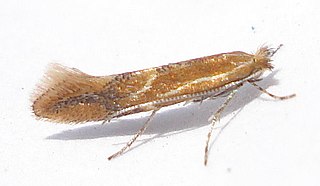
Phyllonorycter corylifoliella, the hawthorn red midget moth, is a moth of the family Gracillariidae. It is found in all of Europe.

Phyllonorycter cerasicolella is a moth of the family Gracillariidae. It is known from all of Europe, except northern Scandinavia.
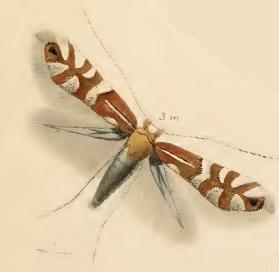
Phyllonorycter ulmifoliella is a moth of the family Gracillariidae. It is found in all of Europe, east to Russia and Japan.

Phyllonorycter emberizaepenella is a moth of the family Gracillariidae. It is found in all of Europe, except the Iberian Peninsula and the Balkan Peninsula.

Phyllonorycter hilarella is a moth of the family Gracillariidae. It is found in all of Europe, except the Balkan Peninsula and the Mediterranean Islands.

Phyllonorycter lautella is a moth of the family Gracillariidae. It is known from all of Europe, except the Mediterranean islands.

The European oak leaf-miner or Zeller's midget is a moth of the family Gracillariidae. It is found in Europe south of the line running from Ireland, through Great Britain, Denmark to Ukraine. It is also found in Macaronesia. It is an introduced species in New Zealand and Australia.

Phyllonorycter nigrescentella is a moth of the family Gracillariidae. It is known from all of Europe except the Balkan Peninsula.

Phyllonorycter quercifoliella is a moth of the family Gracillariidae. It is known from all of Europe, except for the Mediterranean islands.

Phyllonorycter quinqueguttella is a moth of the family Gracillariidae. It is found from Fennoscandia to the Pyrenees, Alps, Hungary and Ukraine and from Ireland to central Russia.

Phyllonorycter rajella is a moth of the family Gracillariidae. It is known from all of Europe, except the Iberian Peninsula and Greece.

Phyllonorycter salictella is a moth of the family Gracillariidae. It is known from all of Europe, east to Russia and Japan.

Phyllonorycter spinicolella, also known as the sloe midget, is a moth of the family Gracillariidae, first described by the German entomologist Philipp Christoph Zeller in 1846. It is probably present in all of Europe.

Parornix loganella is a moth of the family Gracillariidae. It is found from Fennoscandia and northern Russia to the British Isles, Denmark and the Baltic States.

Parornix scoticella is a moth of the family Gracillariidae. It is known from all of Europe.
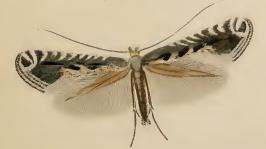
Parornix torquillella is a moth of the family Gracillariidae found in Europe. The larvae mine the leaves of Prunus species, such as blackthorn. It was described by the German entomologist Philipp Christoph Zeller in 1850, from specimens found in Florence, Leghorn and Pisa.

Euspilapteryx auroguttella is a moth of the family Gracillariidae. It is known from all of Europe.















